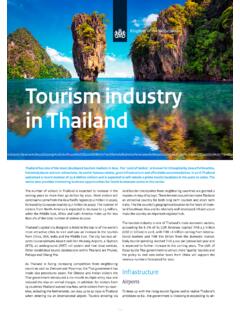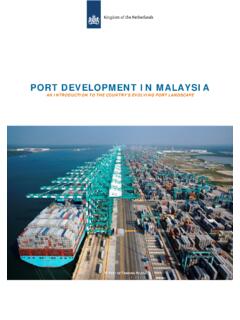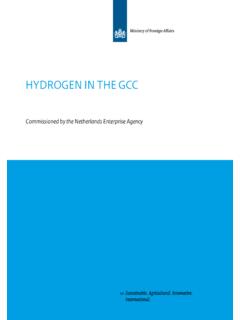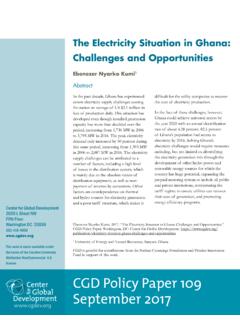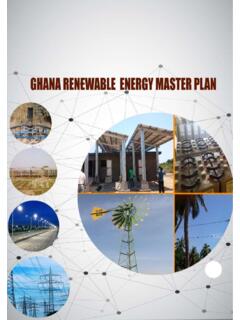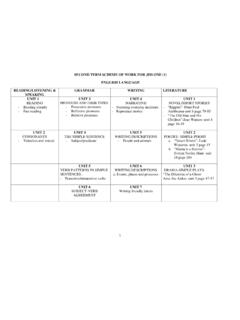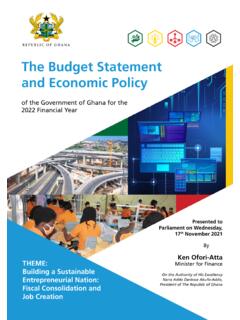Transcription of Solar Report Nigeria - RVO
1 Solar Report NigeriaCommissioned by the Netherlands Enterprise Agency Sector Study Solar Renewable Energy in Nigeria May 2021 Solar in Nigeria | May 2021 Page 1 Executive Summary Nigeria is the largest economy in sub-Saharan Africa with a GDP of approximately $448 billion. It also has the continent s largest population, estimated at over 200 million. Despite this and being one of the largest oil and gas producing countries in the world, it struggles to provide power. With only about 60% electrification, Nigeria falls behind comparable sub-Saharan countries like ghana (83% electrification rate) and Kenya (64% electrification rate). Despite investing billions of dollars in improving electricity supply and privatizing the sector in a bid to reach more efficiency, progress has been slow.
2 Meanwhile, electricity demand continues to grow on the back of population growth and increased local production. Solar energy is considered one of the main ways for Nigeria to reach its electrification targets. It is increasingly adopted across the country: by households to power small appliances, in the shape of mini- grids powering entire markets or ( rural) communities, and by corporate entities who seek to reduce their reliance on expensive diesel generators. The reduced cost of Solar panels and batteries has made a transition to Solar more feasible, and Nigeria is said to be among the fastest growing markets for Solar around the world. Still, the relatively high upfront installation cost deters the lower segment of consumers. Government policies and institutional finance schemes are gearing up to facilitate further growth in Solar .
3 There are many opportunities to tap into Nigeria s Solar energy market, including in offering Solar solutions on a B2B level. We interviewed over 50 companies across different industries relevant for the Solar sector: companies that consume large amounts of energy as well as companies actively involved in Solar already. These stakeholder interviews further confirmed that Solar in Nigeria is a large and growing industry, and that there are opportunities in several applications from agriculture to manufacturing and home systems. The market is looking for better technology at a competitive price as well as engineering skills which can be brought to Nigeria in collaboration with local companies. There is a large playing field of potential partners and many competitors have discovered Nigeria s Solar potential.
4 Despite their presence, there will be abundant chances for Dutch companies to become involved because the opportunity is everywhere. Solar in Nigeria | May 2021 Page 2 List of Acronyms Acronym Meaning AfDB African Development Bank ATM Automated Teller Machine BoI Bank of Industry CCVO Combined certificate of value and origin CFAL Climate Finance Advisory Limited CREE Committee on Renewable energy and Energy Efficiency DisCo Distribution Company ECN Energy Commission of Nigeria EIA Environmental Impact Assessment EPC Engineering, procurements and construction EPSR Electricity Power Sector Reform Act ESP Economic Sustainability Plan EXC Excise Duty FGN Federal Government of Nigeria GDP Gross Domestic Product GenCo Generation Company GHG Green House Gases Green Energy Fund Green Energy Fund GW Giga Watt ID Import Duty IEA International Energy Agency IMF International Monetary Fund IPP Independent Power Producer IRENA International Renewable Energy Agency KW Kilo Watt LCOE Levelized Cost of Energy LVY Levy MAP Meter Asset Provider MESL Mainstream Energy Solutions Limited MESSAGE Model for the Energy Supply Strategy Alternatives and their General Environmental Impact MIGA Multilateral Investment Guarantee Agency MW Mega Watt MYTO Multi-Year Tariff Order NASENI National Agency for Science and Engineering Infrastructure NBET
5 Nigeria Bulk Electricity Trading Company NCS Nigeria Customs Service NEMSA Nigerian Electricity Management Services Authority NEP Nigeria Electrification Project NERC Nigerian Electricity Regulatory Commission NESI Nigerian Electricity Supply Industry Solar in Nigeria | May 2021 Page 3 NESREA National Environmental Standards and Regulations Enforcement Agency NNPC Nigerian National Petroleum Corporation NREEEP National Renewable Energy and Efficiency Policy OBF Output-Based Fund OECD Organisation For Economic Co-Operation and Development PAAR Pre-Arrival Assessment Report PAYG Pay-As-You-Go PC Product Certificate PO Purchase Order PPA Power Purchase Agreement PRG Partial Risk Guarantee PV Photovoltaic REA/NREA ( Nigeria ) Rural Electrification Agency REF Rural Electrification Fund REMP Renewable Energy Master Plan REMP Renewable Energy Masterplan RESIP Rural Electrification Strategy and Implementation Plan SEFA Sustainable Energy Fund for Africa SHS Solar Home Systems SMEs Small and Medium Scale Enterprises SON Standard Organization of Nigeria SONCAP SON Conformity Assessment SPDC Shell Petroleum Development Company SU System Unit UN United Nations UNDP United Nations Development Programme USAID United States Agency for International Development USTDA US Trade and Development Agency VAT Value Added Tax Wp Watt Peak Solar in Nigeria | May 2021 Page 4 CONTENTS Introduction.
6 6 1. Electricity in Nigeria .. 9 Electricity Demand .. 9 Electricity Generation .. 11 Market structure & pricing .. 14 Current 15 2. Solar in Nigeria .. 18 A growing market .. 18 Market segments .. 19 Solar energy value / supply chain .. 19 Key Players .. 21 Barriers to entry .. 23 Impact of the Covid-19 pandemic on the sector .. 24 The future of Solar energy in Nigeria .. 26 3. Financing Solar in Nigeria .. 28 Nigerian government funding .. 28 Commercial funding .. 30 Bi/multi-lateral funds .. 31 4. Business opportunities in Solar .. 33 Solar for households .. 33 Private sector and industrial applications .. 34 Public sector .. 36 Solar companies .. 37 5. Doing business in Nigeria .. 38 Routes to market .. 40 Solar in Nigeria | May 2021 Page 5 Business culture .. 40 Travelling and geography.
7 41 6. Renewable energy laws and regulations .. 42 The legal and regulatory framework .. 42 Licensing .. 43 Import regulations .. 44 Conclusion and next steps .. 46 Appendices .. 47 Appendix 1: key Nigerian companies .. 47 Appendix 2: international competition .. 51 Appendix 3: examples of Solar adoption among companies .. 54 References .. 57 References: companies interviewed .. 60 Solar in Nigeria | May 2021 Page 6 Solar in Nigeria | May 2021 Page 7 Introduction Nigeria is the largest economy in sub-Saharan Africa, with a consumer market of about 200 million people. The Dutch government has identified Nigeria as a key focus in its Africa strategy because of its size, but also the opportunities for bilateral cooperation and Dutch businesses. Nigeria is endowed with large oil, gas, hydro and Solar resources, and has the potential to generate about 12,000 MW of electric power from existing plants, but limitations in the power sector constrain growth.
8 The Netherlands is one of the world s leaders in renewable energy. According to the Nationaal Solar Trendrapport 2021 , the Dutch Solar market grew by 40% in 2020. It is therefore an important sector for Dutch involvement in Nigeria , as it offers energy sector development in Nigeria as well as business opportunities for Dutch companies. This Report is part of the wider efforts of the Netherlands to play a significant role in the development of Nigeria s energy sector, Solar energy in particular. The goal is to deepen existing knowledge, find opportunities for the Dutch companies and explore additional fields for business in energy between the Netherlands and Nigeria . Dutch government agency RVO retained Naijalink as a consulting partner for this project.
9 Naijalink is an advisory and services company that supports international companies in accessing the opportunities in Nigeria . Moreover, we help companies understand Nigerian market conditions and identify relevant in- country business partners. This Report provides an overview of the Solar energy sector in Nigeria to facilitate a better understanding among the Dutch businesses that wish to explore doing business in that sector. The Report is based on data gathered from existing databases and open sources. Moreover, we held over 50 stakeholder interviews with a focus on validating open source information and of course: identifying actual and concrete opportunities for Dutch businesses. Solar in Nigeria | May 2021 Page 8 Solar in Nigeria | May 2021 Page 9 1.
10 Electricity in Nigeria NEPA, a former acronym for Nigeria s electricity company, was usually translated as Never Expect Power Always. After a name change to the Power Holding Company of Nigeria (PHCN), Nigerians simply referred to it as Problem Has Changed Name . This anecdotal evidence points to an inconvenient truth: Nigeria s electricity production is far below demand. About 90 million Nigerians have no access to electricity at all, while the others receive less electricity through the grid than they need. No matter the billions of dollars invested to fix the sector and privatization of electricity assets in a bid to drive efficiency, Nigerians remain dependent on diesel and petrol generators. This does not only fuel pollution but also comes at a great cost to the economy: cost of production in Nigeria (and cost of operation) is significantly higher than in peer countries due to the absence of a proper grid.


